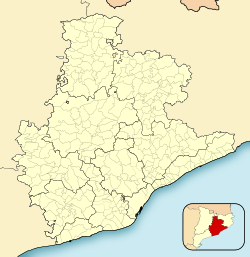San Cugat del Vallés
| Sant Cugat del Vallès | ||
|---|---|---|
| Municipality | ||
 |
||
|
||
| Location in Catalonia | ||
| Coordinates: 41°28′N 2°05′E / 41.467°N 2.083°E | ||
| Country |
|
|
| Community |
|
|
| Province | Barcelona | |
| Comarca | Vallès Occidental | |
| Government | ||
| • Mayor | Mercè Conesa Pagés (2015) (CiU) | |
| Area | ||
| • Total | 48.2 km2 (18.6 sq mi) | |
| Elevation | 124 m (407 ft) | |
| Population (2014) | ||
| • Total | 87,118 | |
| • Density | 1,800/km2 (4,700/sq mi) | |
| Demonym(s) | Santcugatenc | |
| Website | santcugat |
|
Sant Cugat del Vallès (IPA: [ˈsaŋ kuˈɣad dəɫ βəˈʎɛs]) (pop. 81,745 in 2010) is a town and municipality north of Barcelona in Catalonia, Spain. Known as Castrum Octavianum in antiquity (which literally means the castle of Octavianus), it is named after Saint Cucuphas, who is said to have been martyred on the spot now occupied by its medieval monastery. The final part of its toponym, del Vallès, is a reference to the historical county where the town is situated, Vallès.
The town's other buildings include the School of Architecture of the Vallès and the Centre d'Alt Rendiment (CAR, translit. High Performance Centre), a famous centre for professional sport training.
Sant Cugat has become an affluent suburb of Barcelona due to its location (only 20 kilometres from the city), its natural surroundings, and its pedestrian shopping area. Sant Cugat also offers restaurants, a concert venue, two cinemas, and one large shopping centre. It is also a political stronghold for conservative Catalan nationalism, with Convergència i Unió dominating the town's politics.
Sant Cugat has seen its population increase in recent years, with more births than bigger cities like Barcelona (2004). It has also practically merged with the nearby Rubí (population 72,987) and Cerdanyola del Valles (population 58,747).
The town has its own train station with a direct metro connection into Barcelona city centre and the nearby industrial cities of Terrassa and Sabadell.
...
Wikipedia



